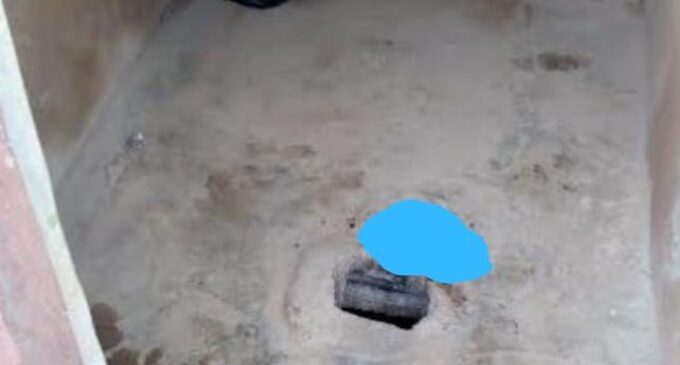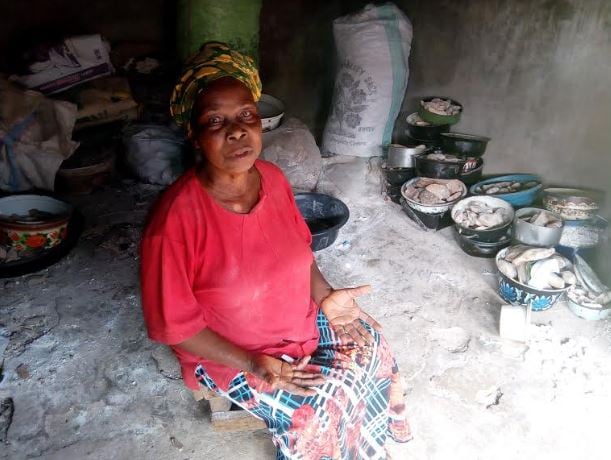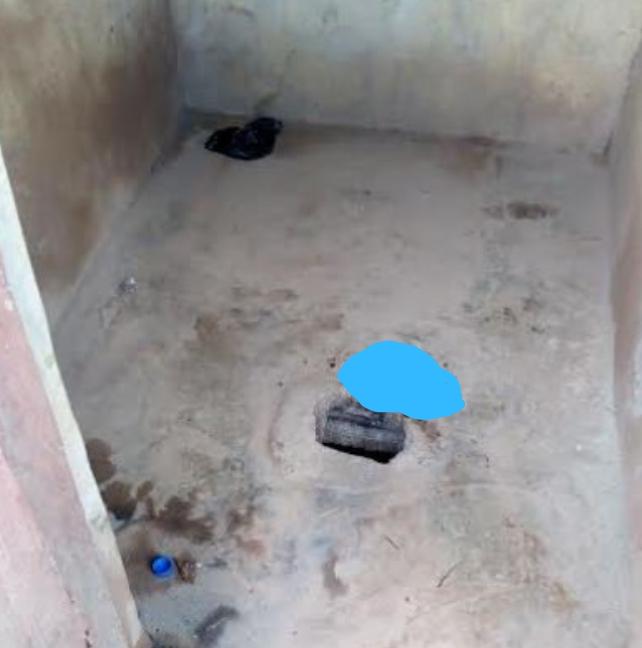Inside Oyo market where traders, sanitation authorities differ on open defecation

It was a bright day on June 25, 2019 when the TheCable visited Ogbere Idi Osan in Ona Ara local government, Ibadan, Oyo state, as part of the on-the-spot assessment of open defecation at the place, facilitated by the UNICEF in collaboration with the federal ministry of information, UKaid and European Union.
One small building housing three toilets is erected inside the market constructed on an undulating surface with no gate or fence. There are three toilets in the building, none of which is gender-sensitive. They are also barely clean, although this can be explained as the result of overuse within short periods of time. Adequate water supply to the facility is also a big issue. A water tank had been installed but it became dysfunctional last year, with a huge toll on hygiene afterwards. It just seemed the traders were aware of TheCable’s visit and had tried their utmost to maintain passable hygiene. But it was obvious the toilets were grossly inadequate.
When a food market is populated by as many as 250 traders, there must be a need for adequate convenience. Otherwise, the market would not be suitable for not only the traders but also visitors. The market is dominated by yam flour sellers – the more so to establish the fact that the local amala is the delicacy in the ancient Ibadan. There are also others who sell oil and assorted stuff.
Sixty seven-year-old Felicia Akindele’s shop is conspicuous in the market. She flashed an infectious smile that seemed rehearsed to woo customers, as it were.

Felicia Akindele
The widow of 14 years said she fends for her family of six with proceeds of her sales which she said had been low in recent times. She blamed this on the economic uncertainty in the country but sales issue was secondary in her consideration. She told TheCable that she had more to worry about.
“The toilets here are not enough to serve our needs and it has become too stressful. There are too many people wanting to use the few toilets at the same time and this has made things most difficult. The toilets are hardly usable also because of the danger they pose to the users like me as my skin is too sensitive and can contract infections,” she said.

Open toilet
“Water supply is another problem because the available water soon gets exhausted and this makes the toilets get locked up at times.”
But conveniences must be met, naturally. So, how does the oldie meet hers?
“It is a hard job, really. I used to bring water from home in cans. But after some time, it became impossible for me to do. So, I had to hold myself till I return home. Besides, there is no toilet to even use anymore because water supply is a big issue,” she said.
Akindele appreciated the opportunity of meeting the media one-on-one: “Please, help us tell government to build more toilets for us. If nothing, at least to enable us attract customers so that we can make enough sales to take care of our families.”
A few steps further, TheCable came across Seliat Ogunsola, an 80-year-old woman who dealt mainly with grinding dried yams into flour. As she made to speak, some stench oozed from a few meters away. She quickly offered explanation: “There is a row of pit toilets nearby. That is the inconvenience we suffer every day.”
The impression had earlier sunk in that the three toilets at the other end were all that there were in the Ogbere Idi Osan market. So, there were more? More curiosity. What a sight it was! There were four pit latrines, a closer look of which brought more oozing stench. They could have been kept clean and tidy. But they were not. Around the dilapidated building housing the latrines, erected interestingly by the Ona Ara local government,was human waste. How trading went on nearby was a case study in human carelessness.
But Ogunsola offered a ready palliative explanation. “We have lodged complaints to the sanitation authorities to no avail. They always promised to do something about it but ended not doing nothing. These days, we bring along bowls from home to defecate in and then throw in the latrine,” she said as her 18-year-old daughter, Aishat, grinded away on the machine, clearly oblivious of the stench.
A twist soon emerged, however, Abimbola Olarinde, principal environment health officer at the local government office, denied knowledge of the operational pit latrines.
“The latrines were closed long ago and I am sure no one uses them any longer,” she said.
But if the latrines were not in use, why were they kept open and accessible?
“As far as we are concerned, the use of the latrines are illegal and offenders risk arrest and prosecution,” Olarinde said, although she declined giving details on who have been arrested and prosecuted so far. She rather offered words on the ‘clean’ toilets at the other end.

Health officer, Olarinde
“We are trying our very best in educating the traders on general hygiene in the market and not only on the toilets,” she said.
But how can hygiene be preached where water is hardly adequate?
“We are working with the Ona Ara local government on the need to make water available in the market at all times because the health of the traders and visitors are paramount to us,” she said.
The local government had laid claim to being open defecation-free, leading to TheCable’s visit which exposed the claim as false.
According to UnICEF, Nigeria is number one in open defecation in Africa, second only to India in the world, and could actually have been number one in the world, safe for India’s population of 1.2billion compared to Nigeria’s 200 million.
With the effort of the Nigerian government, in collaboration with UNICEF and other stakeholders, the country has set 2025 as deadline to end open defecation. UNICEF’s findings show that 47 million of Nigeria’s population defecate in the open.
Of these, 16 million live in the north-central part of the country. It cannot be ascertained how many ordinary or improved toilets there are at the moment, but UNICEF reckons that Nigeria requires two million toilets per year between this year and 2025 to attain the target. The negative implication of the failure to achieve the target on all sectors of the national life cannot be ignored in the overall interest of the well-being of the citizens.

Hidden latrine
UNICEF has, among other interventions, made conscious effort at bringing Water, Sanitation and Hygiene (WASH) to disadvantaged communities in rural areas and improving access to safe water and sanitation in schools and health care facilities, in addition to promoting hygiene and sanitation, while creating awareness among the people through effective collaboration with the media that would aim to encourage and support behavioral change towards achieving the ultimate success.















There are no comments at the moment, do you want to add one?
Write a comment